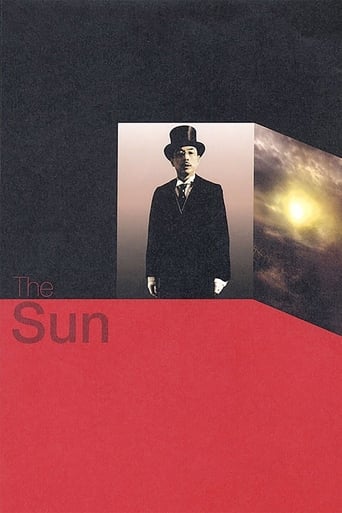Roland E. Zwick
Alexander Sokurov's austere, moody and claustrophobic chamber piece, "The Sun," takes place in Tokyo in 1945, just as the victorious American forces are overtaking the city. The focus of the film is on Emperor Hirohito (believed by his subjects to be a direct descendant of the Sun goddess Amaterasu ) who, holed up in a bunker in the royal palace, agonizes over how such an ignominious fate could have befallen his nation and his people – and the part he himself may have played in bringing that outcome about.Hirohito spends much of the first half of the film engaging in deep introspection and personal recrimination, blaming himself for having placed too much faith in the power of the Empire and for relying too heavily on the enthusiasm of the soldiers rather than properly equipping the army. Meanwhile, he pores over old family photo albums as well as pictures of glamorous Hollywood stars of the time, suggesting that he clearly doesn't despise all things American, even if that nation has become the cause of his downfall.In the second half of the movie, Hirohito finds himself under house arrest, where his American captors ply him with wine and chocolate bars as they negotiate the terms of his surrender. Then he's brought before General MacArthur himself, who treats the defeated emperor with outward politeness but inward condescension and dismissiveness. The result is a subtle little game of cat-and-mouse in which two of the great figures of their time vie for position and power – both personal and diplomatic.A largely fictionalized, impressionistic account of historical events, "The Sun" is definitely an acquired taste. Its subdued tone, spare settings and desultory pacing may be off-putting to some in the audience, and the acting by the American performers is amateurish in the extreme. But there's a haunting quality to the film as well, as a man once convinced of his own infallibility, divinity and immortality is forced to face the fact that, like the rest of humanity, he has feet of clay – and finds what a truly liberating and unburdening thing that can be in the long run.
kosmasp
This is a very minimalistic effort. A movie where it seems nothing much happens and which moves along so slow, even snails would be annoyed. So if go into the movie expecting something fast, with fancy camera work (it's great camera work and the set/costume design is superb), where the camera brings in an action level, you'd be mistaken.But what you do get, is a wonderfully crafted story, with exceptional acting. And while this is a Russian movie, it plays in Japan and has Japanese values written all over it. While it could be described as boring, I really liked every little bit of it. The stillness and ambiguity, the main character "fighting" to maintain a status. The cruel treatment he seems to be getting by some and of course the clash of the cultures. Subtle, sublime and very well done.
elfinadrawer
this is an awful film; it could have been condensed into about 30 minutes. it was long, boring, and slow, with nothing interesting or compelling about it. there was bad acting on the part of everyone other than whoever played hirohito, especially whoever played macarthur and all the other Americans. furthermore, hirohito is such an unappealing personality--ugly, awkward, mouth spasms--that it was downright painful to watch two hours of him floundering about, accurate as the portrayal may be.i believe this film is intended to be a deep meditation on power's end, but its flaws greatly outnumber its virtues. it failed to convey an interesting story or to entertain me in any way.
Chris Knipp
Sokurov's haunting recreation of how Emperor Hirohito spent the last hours before the Japanese surrender, this is a miraculous work, and it provided the most powerful aesthetic and emotional experience of the 2005 New York Film Festival, whose official selections were not lacking in depth and fine film-making. "The Sun" depicts a man who knows very well what is going on but lives in a cocoon, in a state of detachment and ineffectuality that becomes strangely heartrending. Issey Ogata's performance as the Emperor easily competes for hypnotic intensity with Bruno Ganz's Hitler in the German film "Downfall" -- but with a very different sort of bunker and a very different kind of man: a silent, immaculate country house with a few faithful servants in attendance; a small, frail but upright and dignified personage who can easily explain the causes of the Japanese defeat to his general staff but has never learned to dress himself or open a door. Even on this day he is more comfortable browsing through photos of his family and American movie stars, dictating notes on marine biology, and writing poetry. Despite the disgrace, he is selflessly happy that peace has come. He inks a brush to write a statement to his absent son, but instead drafts a few verses about the weather. Later he is taken to see Eisenhower, and then brought back again to dine with the general. He enjoys the wine and the meat and has his first taste of a Havana cigar. The Americans conclude that the Emperor is like a child. "What's it like being a living god?" Ike asks. And speaking, to the dismay of the Japanese interpreter, in perfect English, Hirohito says, "What can I tell you? You know, it is not easy being Emperor." These are just a few details in a film rich in telling ones. Simply enumerating them can't explain this film's slow, cumulative emotional wallop -- or the lovely, fantastic, dreamlike landscape images toward the end. This film about one of modern history's most humiliating defeats is a stunning triumph. "The Sun" demonstrates unmistakably that Andrei Sokurov is one of the world's great filmmakers.


